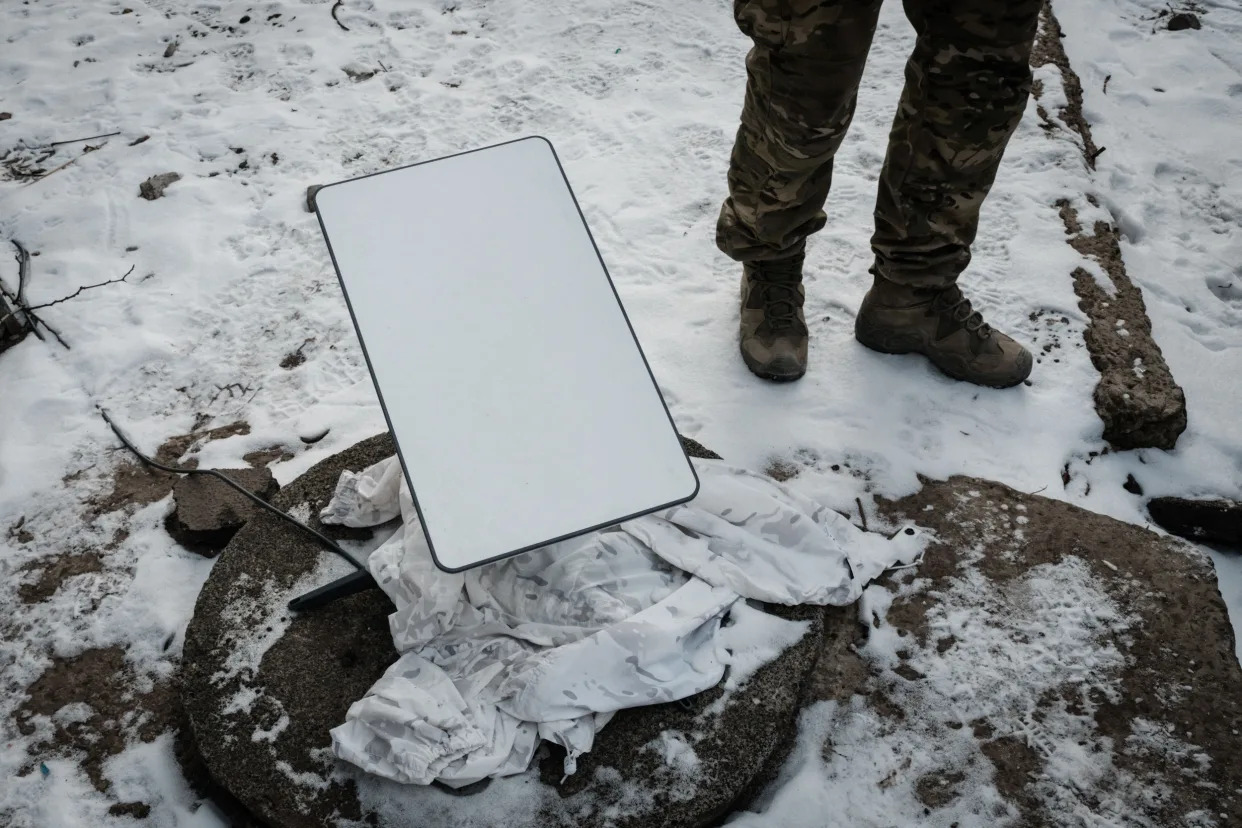Sean Lyngaas, CNN
Fri, September 8, 2023
Elon Musk secretly ordered his engineers to turn off his company’s Starlink satellite communications network near the Crimean coast last year to disrupt a Ukrainian sneak attack on the Russian naval fleet, according to an excerpt adapted from Walter Isaacson’s new biography of the eccentric billionaire titled “Elon Musk.”
As Ukrainian submarine drones strapped with explosives approached the Russian fleet, they “lost connectivity and washed ashore harmlessly,” Isaacson writes.
Musk’s decision, which left Ukrainian officials begging him to turn the satellites back on, was driven by an acute fear that Russia would respond to a Ukrainian attack on Crimea with nuclear weapons, a fear driven home by Musk’s conversations with senior Russian officials, according to Isaacson, whose new book is set to be released by Simon & Schuster on September 12.
Musk’s concerns over a “mini-Pearl Harbor” as he put it, did not come to pass in Crimea. But the episode reveals the unique position Musk found himself in as the war in Ukraine unfolded. Whether intended or not, he had become a power broker US officials couldn’t ignore.
Musk did not respond to CNN’s request for comment before publication. But he did respond to the Isaacson book excerpt late Thursday on X, the platform formerly known as Twitter that he owns, by asserting that the Starlink service provided by his company SpaceX was never active over Crimea and that the Ukrainian government made an “emergency request” to him to turn on service.
“There was an emergency request from government authorities to activate Starlink all the way to Sevastopol,” Musk posted on X, the platform formally known as Twitter that he owns. Sevastopol is a port city in Crimea. “The obvious intent being to sink most of the Russian fleet at anchor. If I had agreed to their request, then SpaceX would be explicitly complicit in a major act of war and conflict escalation.”
The new book from Isaacson, the author of acclaimed biographies of Steve Jobs and Albert Einstein, provides fresh insights into Musk and how his existential dread of sparking a wider war drove him to spurn Ukrainian requests for Starlink systems they could use to attack the Russians.
After Russia disrupted Ukraine’s communications systems just before its full-scale invasion in February 2022, Musk agreed to provide Ukraine with millions of dollars of SpaceX-made Starlink satellite terminals, which became crucial to Ukraine’s military operations. Even as cellular phone and internet networks had been destroyed, the Starlink terminals allowed Ukraine to fight and stay connected.
But once Ukraine began to use Starlink terminals for offensive attacks against Russia, Musk started to second-guess that decision.
“How am I in this war?” Musk asks Isaacson. “Starlink was not meant to be involved in wars. It was so people can watch Netflix and chill and get online for school and do good peaceful things, not drone strikes.”
Musk was soon on the phone with President Joe Biden’s national security adviser, Jake Sullivan, the chairman of the joint chiefs, Gen. Mark Milley, and the Russian ambassador to the US to address anxieties from Washington, DC, to Moscow, writes Isaacson.
Meanwhile, Mykhailo Fedorov, a deputy prime minister of Ukraine, was pleading with Musk to restore connectivity for the submarine drones by telling Musk about their capabilities in a text message, according to Isaacson. “I just want you—the person who is changing the world through technology—to know this,” Fedorov told Musk.
SpaceX did not reply to CNN’s requests for comment
.
A Ukrainian soldier disconnects their Starlink on the front line during a ceasefire announced by Russia over the Orthodox Christmas period, January 6, 2023. - Clodagh Kilcoyne/Reuters
Musk, the CEO of electric carmaker Tesla and private space exploration firm SpaceX, replied that he was impressed with the design of the submarine drones but that he wouldn’t turn satellite coverage back on for Crimea because Ukraine “is now going too far and inviting strategic defeat,” according to Isaacson.
The unchartered territory that Ukrainian and US officials were in – relying on the charity of an unpredictable billionaire for battlefield communications – also led to a standoff over who would pay for the Starlink terminals last fall.
SpaceX had spent tens of millions of its own money sending the satellite equipment to Ukraine, according to Musk. And the company told the Pentagon that they wouldn’t continue to foot the bill for the satellite gear, as CNN first reported last October.
After CNN’s reporting, Musk reversed course, tweeting “the hell with it … we’ll just keep funding Ukraine govt for free.”
Gwynne Shotwell, Musk’s president at SpaceX, was livid at Musk’s reversal, according to Isaacson.
“The Pentagon had a $145 million check ready to hand to me, literally,” Isaacson quotes Shotwell as saying. “Then Elon succumbed to the bullshit on Twitter and to the haters at the Pentagon who leaked the story.”
But SpaceX was eventually able to work out a deal with the US and European governments to pay for another 100,000 new satellite dishes to Ukraine at the beginning of 2023, according to Isaacson.
Starlink’s importance in the war hasn’t waned.
Last week, the US and its “Five Eyes” allies accused Russian hackers of targeting Ukrainian commanders’ battlefield communications. The Russians’ malicious code was designed to intercept data sent to Starlink satellites, according to the Ukrainians.
Musk says he limited Ukraine's Starlink to prevent attack on Russia
Devin Coldewey
Fri, September 8, 2023

Image Credits: YASUYOSHI CHIBA/AFP / Getty Images
Elon Musk has confirmed that he in essence scuttled a Ukrainian military strike on Russia by refusing to allow Starlink to be used in the process. The billionaire claims the decision was made to avoid being "complicit in a major act of war," but it also raises serious questions regarding the role of oligarchs in military matters.
The news was first reported by CNN, citing Walter Isaacson's upcoming biography of Musk. In the book, Musk describes a situation in 2022 when Ukraine planned an attack on Russia's navy off the coast of Crimea.
The ships and marine drones that would have performed this attack relied on Starlink for connectivity, but the satellite internet service was not (Musk asserted later on X/Twitter) active over the region. When Ukraine made an "emergency request" to activate it, he refused, and the drones "lost connectivity and washed ashore harmlessly," obviously leaving the Russian ships untouched.
In a way the matter is very simple: a government requested a service from a private company that the leader of that company thought was inappropriate, and declined. Therein is demonstrated the inherent risk of relying on a private service for the prosecution of warfare — Musk was in effect a mercenary or arms dealer, albeit less directly involved in violence. (Russia itself would soon have its own demonstration of a similar principle when the Wagner Group marched on Moscow.)
But in another, far more troubling interpretation of events, an American billionaire made a unilateral military decision for a foreign allied power. Doubtless this has happened countless times before, but seldom has a technology from outside the military-industrial complex (and thus outside its norms and expectations) risen so quickly to prominence as Starlink has due to — it must be said — Musk's own promotion of it for use by Ukraine after Russia's invasion.
The complex mathematics of geopolitics are beyond the scope of this article (and indeed this site and your author), but it is hard not to wonder whether it is appropriate for Musk to offer a key service to support Ukraine, only to withdraw it at his own discretion.
"If I had agreed to their request, then SpaceX would be explicitly complicit in a major act of war and conflict escalation," Musk wrote in justification of his decision.
This is fair enough in its way, but, as with many of the CEO's pronouncements, is profoundly dismissive of important context.
Leaving aside that Starlink had been a key enabler of countless military actions already, one does not need to be an expert to find dubious Musk's claim that this would have amounted to a "mini-Pearl Harbor." Ukraine and Russia were by this time in open war, instigated by the latter's invasion; to compare a counterattack against an aggressor during a serious and ongoing conflict to the infamous sneak attack that drew the U.S. into World War II is at best ignorant. But considering Musk's proposals that the conflict end with concessions to Russia, it feels more disingenuous.
It is simply untenable for Musk's personal opinion of how a conflict should play out is the sole determinant of how Starlink can be deployed in warfare. As advisor to Ukrainian PM's office, Mykhailo Podolyak, expressed on X/Twitter after the story hit:
Sometimes a mistake is much more than just a mistake. By not allowing Ukrainian drones to destroy part of the Russian military (!) fleet via #Starlink interference, @elonmusk allowed this fleet to fire Kalibr missiles at Ukrainian cities. As a result, civilians, children are being killed. This is the price of a cocktail of ignorance and big ego.
Is Musk willing to perform the value judgment of whether negating an attack on Russian materiel is worth the inevitable cost in Ukrainian lives? Because that is the position he has placed himself in: deciding who should live in a war taking place on the opposite side of the world.
It's not hard to imagine that Musk may think himself capable of doing this, but it would not be the first time he has overestimated his own competence. The question is not whether he can make the choice, but whether he, or anyone in a similar position of civilian or commercial power, should be permitted to make it.
Garry Kasparov, former world Chess champion and now a prominent activist, offered a simple summary:
"SpaceX & Starlink are marvelous, but if Musk's delusional "anti-war" agenda leads him to interfere with their services to Russia's advantage, it's a huge risk."
The situation Musk found himself in was new and unprecedented, but now it is neither. And those for whom life-and-death decisions are familiar territory will likely find ways to circumvent an interfering foreign oligarch in making them.

No comments:
Post a Comment